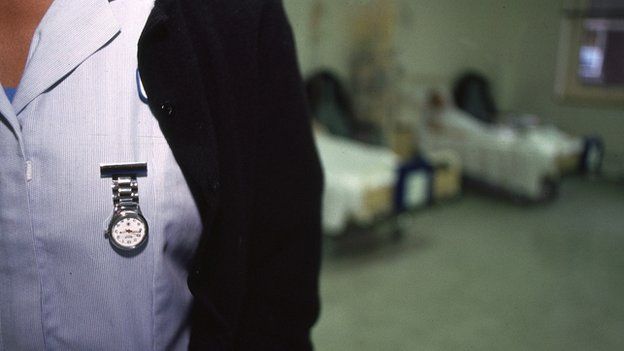NHS to target 'rip-off' staffing agencies
- Published

Mr Stevens said the NHS needs to offer its staff nurses more 'flexible employment'
The health service plans to "clamp down on some of the staffing agencies ripping off the NHS", the chief executive of NHS England has said.
Simon Stevens admitted that NHS hospitals were "over-spending" on temporary staffing.
But he told BBC One's Andrew Marr Show that the NHS would be taking action against staffing agencies.
Mr Stevens also said hospitals needed to ensure they offered "flexible employment" to nursing staff.
He said: "What we've got to do is convert that [agency] spending into good, paying permanent jobs."
Mr Stevens drew attention to a recent regulator's report, which showed that NHS foundation trusts in England spent £1.8bn in 2014 on agency and contract staff - more than twice the planned amount.
He said the rise was partly due to hospitals putting more nurses on wards, following the public inquiry into the Stafford Hospital scandal.
Though he admitted it was "very hard" for individual hospitals to take action against agencies, he said "collectively the NHS can take action here and we will be doing that".
'Top dollar'
Dr Peter Carter, chief executive of the Royal College of Nursing (RCN), told the BBC that Mr Stevens was "spot on", arguing that agencies are currently charging "top dollar".
He said: "The reality is that because of very poor workforce planning and because of cuts, particularly in the number of new student nurses taken on, the NHS is now playing catch-up and to fill that vacuum agencies have stepped in."
But the managing director of the agency Nursdoc Recruitment, Robert Stiff, claimed agency staff can save the NHS money.
He said: "The demand on the NHS is not consistent, it does go through peaks and troughs. And having an agency to provide services at the last minute allows the NHS in a way to save money, because they don't need to have full resourcing on their wards all the time."
The prime minister, pictured on a visit to Whitney hospital in April, has vowed to create a seven-day NHS
Though more staff nurses are now being trained, Dr Carter claimed: "We are still not back up to May 2010 levels and we would have actually said that in May 2010 there weren't enough, [the cuts] shouldn't have happened".
He called for more flexible working hours, pointing out that 90% of nurses are women - many of whom have childcare responsibilities and are unable to work rigid shift patterns.
A spokesperson for the Department of Health said that there are 8,200 more nurses working than there were in May 2010.
However, the RCN highlighted its figures from April suggesting the increase in the total nursing workforce is 1,470 if the numbers of midwives, health visitors and school nurses are stripped out.
Seven-day savings
Commenting on Prime Minister David Cameron's vow to create a "seven-day" health service, Mr Stevens said it would incur extra costs but could also provide savings.
The government has committed to a pre-election pledge to boost NHS funding by at least £8bn a year by 2020.
Asked whether that would cover the extra needed for the new service, he said: "There will be costs associated with it but there will also be efficiencies.
"And the reason for that is that if you're admitted to hospital on a weekend your length of stay in hospital [currently] turns out to be rather longer because some of the other services you need aren't in place."
Cancer cells: Mr Stevens described obesity as the 'new smoking', now causing one in five deaths
In a wide ranging interview on the Andrew Marr Show, Mr Stevens described obesity as the "new smoking", urging parents, schools and the food industry to do more to tackle it.
He pointed to a string of Saturday newspaper reports warning that obesity will soon overtake smoking as the leading cause of cancer.
Mr Stevens said one in five cancer deaths was now caused by obesity, adding that the food industry had a "huge responsibility here".
He said: "I do think we are going to need reformulation to take sugar out of foods in the same way that has successfully happened with salt over the last several years. I think responsible retailers, food producers, can smell the coffee here.
"They can see that public attitudes are changing and they are going to need to take action because we can see that if that doesn't happen, then in effect what we are doing is a slow burn of food poisoning through all of this sugar that then goes on to cause cancer, diabetes, heart disease.
"That's what we are doing to our kids, we've got to stop it."
- Published22 May 2015